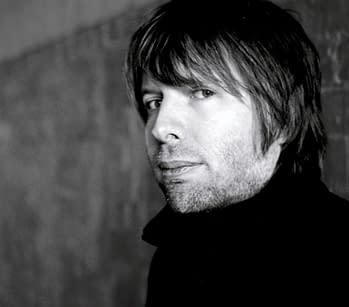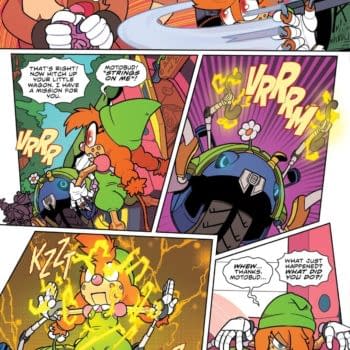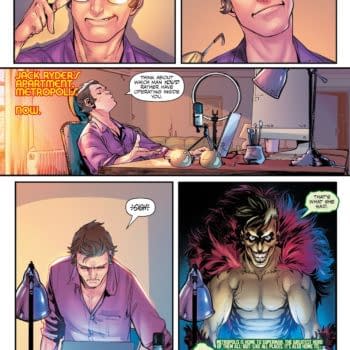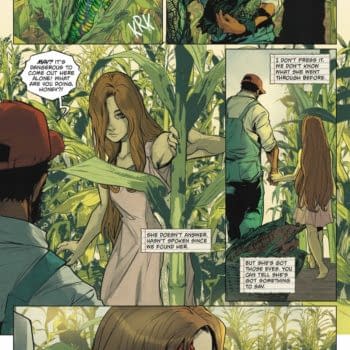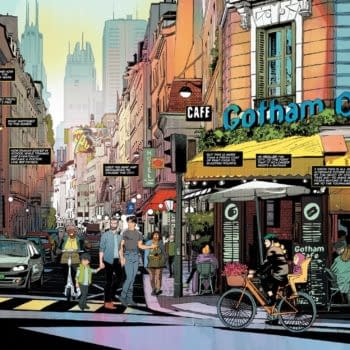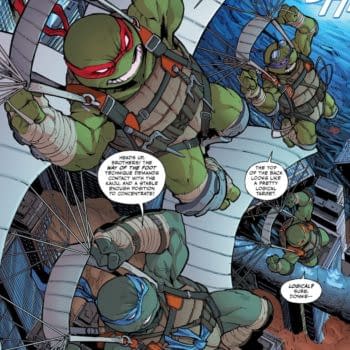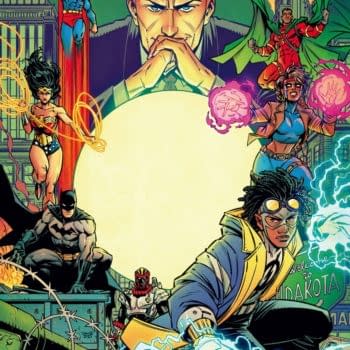Posted in: Comics, Recent Updates | Tagged: Adam Christopher, entertainment, Fleetspace, science fiction, The Burning Dark, titan books
The Burning Dark: Talking With Sci-Fi Author Adam Christopher
By Alasdair Stuart
Adam Christopher is one of the new wave of genre fiction authors currently sweeping across bookshelves, whether they're made of print or electrons. His novels for Angry Robot; Empire State, Age Atomic, Seven Wonders and Hangwire have all met with huge success and now he's stepping across to Titan Books for a trilogy. The Burning Dark opens with Captain Abraham Cleveland accepting a last, simple assignment before retirement. Isolated, increasingly paranoid and lonely, Cleve finds himself striking up a conversation that seems to span light years and may prove as dangerous as it is vital…I talked to Adam about the new book, Fleetspace and what it means to be a hero.
Alasdair Stuart: How does this new trilogy differ tonally from your previous books?
Adam Christopher: It's a lot darker than anything I've done so far – the original idea I had was one of those great "what if…?" questions. What if you had a traditional ghost story in a haunted house, but instead of a house, it was a space station? So it really built from there, and obviously with that starting point it was always going to be pretty creepy. Another aspect of the story, the urban legend of the lost cosmonauts, is also pretty weird and spooky, so when I put the two together it became this "dark space opera", which seemed pretty cool.
AS: What influenced it's design?
AC: The legend of the lost cosmonauts, Blake's 7, and every ghost story I read as a child, with a healthy dash of Japanese mythology. If I said any more it would be a spoiler!
AS:What about Fleetspace? Is it a grim, militaristic place or is it simply the name for settled space?
AC: Fleetspace is the official name for the section of the galaxy settled by Earth and its colonies (the Fleet are big on giving things their official designations), but it's not really a dystopia – while everything is more or less connected with the war, there are still independent colonies and private enterprises, and life goes on for most people. It's a benevolent dictatorship, ruled over by the Fleet Admiral. Or at least that's what the Fleet wants its citizens to think!
The Fleet also want people to think the war is going well, so most of the population is happily patriotic, especially on Earth. But as you get further out into the colonies, things can get pretty bleak.
AS: The Fleet is one of those ideas that echoes up and down SF. What attracted you to the idea of an organization so large and powerful?
AC: It was a logical part of the story – as humanity spreads outwards into space, carving an empire (complete with neo-imperial colonialism), they found something else out there: the Spiders. So great was the threat that the entirety of human space was unified into a single political-industrial-military complex, the Fleet. Human history is characterized by endless conflict, but it took a massive external threat to unite everyone.
Certainly there are some classic sci-fi tropes there, but the Fleet is probably somewhere between Star Trek's United Federation of Planets and the Galactic Empire from Star Wars. Not exactly a tyrannical dictatorship, but not squeaky clean either.
AS: Cleveland's taken more than his fair share of damage. What do you think attracts us to damaged heroes?
AC: I think all heroes are flawed in some way – because we are ourselves. And if we can see something of ourselves in our heroes, then we can identify with them and, ultimately, root for them when they do heroic things that we can't. The nature of heroism is a very large topic indeed! But I like Ida. He seems like the kind of guy you could hang out with, have a few beers.
AS: Was it always intended to be a trilogy or did the book expand over time?
AC: It's more an open-ended world – the first three books are sequential, but not direct sequels. So we meet new characters in each and see other aspects of the war – and some characters return. There's a loose arc connecting the three, but each are more-or-less standalone. And of course there is an even larger arc, about how the war started and where the Spiders came from. The first three books won't answer that particular question, but they will provide some pointers!
I wrote The Burning Dark as a standalone, but it became clear that there was a whole world here to explore. So while I was writing the first book, I was already making notes for other stories. Something like Cold War , a novelette I wrote for Tor.com, is an example of a tale of the Spider Wars that isn't directly connected to the first book.
AS: Are there plans for any more stories set in this universe?
AC: I have plans for lots of stories after the first three books! But we'll see how it goes!
Thanks Adam. The Burning Dark is out now from Titan. Adam's other books, Empire State, The Age Atomic and Hangwire are available now from Angry Robot Books. Adam's website is over here and he's on Twitter at @Ghostfinder.
Alasdair Stuart is a freelance writer. He hosts Pseudopod (www.pseudopod.org), co-hosts Escape Pod (www.escapepod.org) and is currently writing the 10th Doctor Sourcebook for the Doctor Who RPG. One line in The Girl in the Fireplace WRECKED him, just like it always does. Find him on twitter at @AlasdairStuart and read his blog at www.alasdairstuart.com



